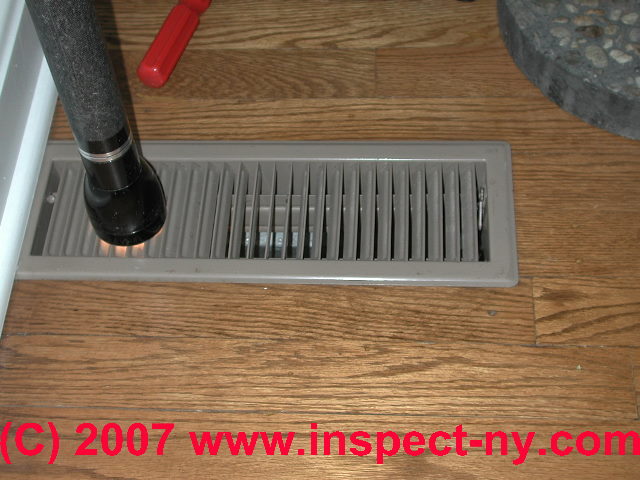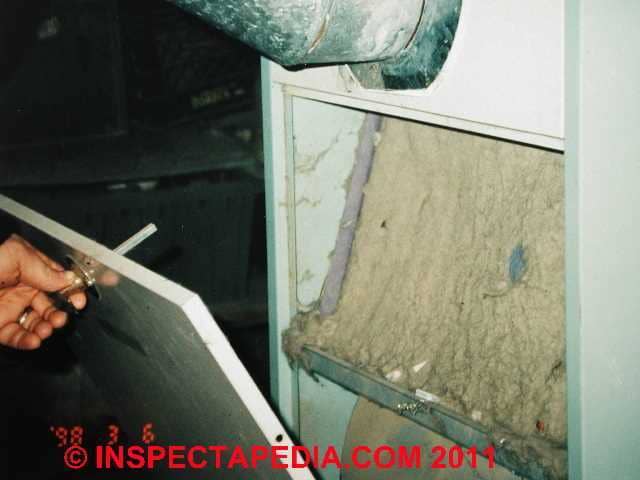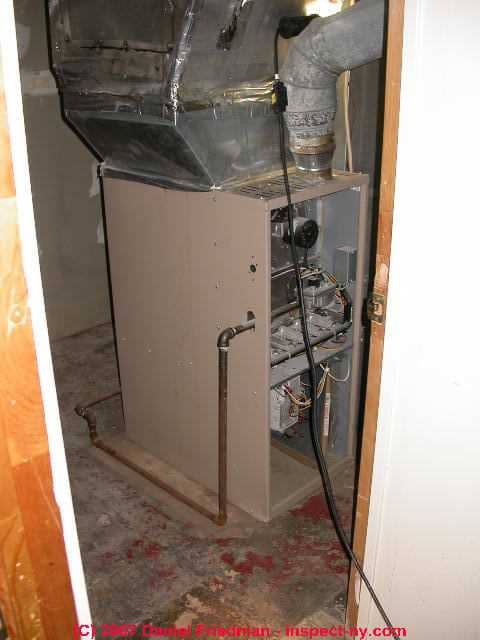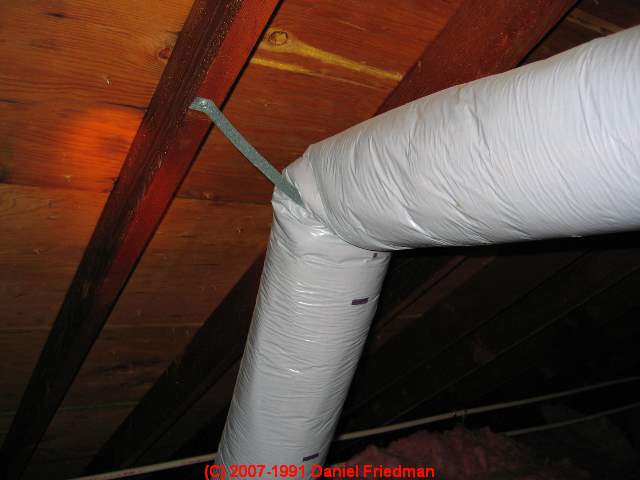 Air Conditioner, Furnace, or Heat Pump Weak Air Flow
Air Conditioner, Furnace, or Heat Pump Weak Air Flow
Fix weak air flow from an HVAC cooling or heating system
- POST a QUESTION or COMMENT about air conditioner or heat pump system cooling diagnosis & repair
Air conditioner air flow too weak:
How to diagnose weak or too-warm air flow from an air conditioning or heat pump system.
If not enough cool air is provided by your air conditioner, or if the air temperature is not cool enough, or if you just can't get your A/C unit running, this article helps diagnose and correct the problem with step by step things to check and links to more detailed explanation when you need it.
This article forms part of our series on how to diagnose an air conditioner or heat pump that is not cooling: this article explains how to diagnose and correct air conditioning problems like lost or reduced air conditioner cooling capacity, reduced or no cool air flow, reduced or no actual lowering of the air temperature, or an air conditioner that won't start.
InspectAPedia tolerates no conflicts of interest. We have no relationship with advertisers, products, or services discussed at this website.
- Daniel Friedman, Publisher/Editor/Author - See WHO ARE WE?
How to Diagnose Air Conditioner Output Cool Air Flow Too Weak, Too Cold, or Too Warm
WEAK AIR FLOW: is the air conditioner (or when heating, the heating system) blower fan unit not moving enough air, so that there is too little air coming out of your air supply registers? Here is a list of things to check, in the best order.

Sketch courtesy of Carson Dunlop Associates, a Toronto home inspection, education & report writing tool company [ carsondunlop.com ].
1. Check that the air register is open
2. Check for a dirty or clogged air filter:
replace the filter.
Watch out: some HVAC systems have more than one air filter in more than one location. Be sure you've found all of them. For example a filter may be located at a central return air inlet grille and another may be located at the air handler itself.
Clogged Air Conditioner filters
can lead to lost cooling capacity first, because the clogged filter reduces the air flow through the system, meaning that you'll feel less air flow at the supply registers than was previously present.
See AIR FILTERS for HVAC SYSTEMS for details.
3. Check for a dirty or broken blower fan:
if the squirrel cage fan in the blower unit is dirty the blower may be spinning but not moving much air. If the blower is a belt-driven unit check that the belt is intact and that the blower spins.
See DIRTY A/C BLOWERS for details.
If you don't know what an "air handler" or blower unit is, or for more blower unit diagnostics
see AIR HANDLER / BLOWER UNITS
4. For Cooling Systems: Check for an iced cooling coil
inside the air handler; a refrigerant leak can cause frosting while later the when more refrigerant has been lost the result is delivery of inadequately-cooled air.
Air flow that is too slow for any reason (such as a dirty filter or dirty blower fan assembly blades) can cause first, air temperatures that are abnormally low coming out of the air conditioner, and eventually a reduction in air flow as coil ices over.
See FROST BUILD-UP on AIR CONDITIONER COILS and
also
see DIRTY COOLING COIL / EVAPORATOR COIL
5. Check the ductwork for any cause of blockage, partial blockage (crimps, excessive bends), leaks, disconnects. Blocked, crimped or disconnected air ducts can also cause loss of cool air or too little cool air coming out of supply registers.
Reader Comment: faulty HVAC Duct Fire Damper Blocks Airflow
2016/01/22 Peter said:
No air coming from vents in your commercial building? We had a 7 ton unit that was supposed to heat and cool two big rooms and some bathrooms. Nothing was heating up those rooms.
The 7 ton Rudd was new, everything was checked, even a bigger gas pipe was put to it. While the ducts at coming directly from the 7 ton were shaking with air flow, no air flow was coming from the ducts in the rooms, which were about 50 feet away.
At first we thought it was the ductwork design. It literally had about 15 turns in it to get from the roof to the building. We thought it might be leaks. Perhaps insulating the roof ductwork.
Because nothing seemed to fix the problem, and we had tenants, we spent a fortune putting in at first, temporary radiant heat, and then permanent electric radiant heat.
After months of trying to figure this out, my HVAC guy finally discovered the problem. Commercial ducts have Fire dampers in them.
Fire dampers are passive fire protection products used in heating, ventilation, and air conditioning (HVAC) ducts to prevent the spread of fire inside the ductwork through fire-resistance rated walls and floors. Fire/smoke dampers are similar to fire dampers in fire resistance rating, and also prevent the spread of smoke inside the ducts.
When a rise in temperature occurs, the fire damper closes, usually activated by a thermal element which melts at temperatures higher than ambient but low enough to indicate the presence of a fire, allowing springs to close the damper blades.
So, apparently with us, a fire damper in our ductwork decided to close. We easily spent thousands and thousands in emergency heating only to find out it was a defective $100 fire damper.
Reply:
Peter,
Thank you for the important report on the big hidden cost of a defective fire damper on heating costs.
While I've made the general point about looking for duct obstructions I'd not considered fire dampers, devices designed to "fail" in the closed position for fire safety. I'll add your remarks to the article as you will surely thus help other readers.
See AUTOMATIC FIRE & SMOKE DAMPERSfor details about these devices.
Other HVAC Air Delivery Problems: no air flow, air flow too warm, air too humid
NO AIR: Is there no cool air at all coming out of the supply registers at all?
Check all of the heating and cooling controls to be sure that they are set properly and working normally. The thermostat is set to COOL, FAN to AUTO or ON, HEAT to OFF, and the set temperature on the thermostat is set below room temperature (if you want cooling).
SNAFUs in the individual controls and relays and switches for the air handler, blower, compressor/condenser unit and refrigerant metering equipment will, if not working properly, lead to these same complaints.
Check the following causes of complete loss of air flow
- Are there closed supply or return registers, or a closed ductwork damper.
- Is the thermostat not calling for cooling or heating as appropriate
- Has the system lost electrical power
- Is there a blower unit that is not operating because a blower door is open (door switch shuts off the system)
- is there a condensate pan switch that has shut down the blower assembly, disconnected ductwork
- Is there a completely frost-blocked cooling coil
AIR TOO WARM: Or is there air blowing out of the supply registers but it's not cool enough?
Typical causes of too-warm air flow out of an HVAC system in cooling mode are
- Refrigerant leaks & lost refrigerant
- Air flow moving too fast across the cooling coil
- Backup heat is stuck on (discussed below)
- Insulation missing from the duct system
- Ducts routed through a hot, un-conditioned space
AIR TOO HUMID: if the air conditioning system is not dehumidifying, and presuming no one has left windows or doors open to humid outdoor air, air flow may be too rapid or the system may be over-sized.
See DEHUMIDIFICATION PROBLEMS
HVAC Control SNAFUs That Can Lead to Too-Warm Air Conditioning or Weak Air Flow
As you read below, a reader (Pete) reminded us that even when the A/C system seems to be working properly a too-warm air output problem in a heat pump system could be due to emergency or backup-heat being left in the "ON" position.
Why is my heat pump blowing warm air?
I have an old unit that will not blow cool/cold air. I have had a tech out twice and I am trying to see if there are any things that I can check or ask my technician to check. The tech had the unit working properly, after his last visit, until about 2 weeks ago. At that time we had a cold-snap and I had to turn my heat back on. When I turned it back to AC it has not worked properly since.
The outside unit (condenser) is running as is the air handler. Plenty of air is blowing out of the registers but it is only about 70-71 degrees. I do not know anything about fixing ACs but I am pretty handy and I have been researching on the web.
Some of the viable options I found are a stuck or bad REVERSING VALVE on HEAT PUMPS, coolant line could be blocked or contaminated or the Thermostatic Expansion Valve could be bad. Does that sound right? Any thoughts? Also, I noticed that the high pressure line (small copper tubing, I think) coming out of the outside condenser is cold to the touch.
Should that not be warm/hot? I really would like to get one more season out of the unit. PS: all filters are clean. 4/30/2014 Pete
Reply:
With the benefit of hind-sight - your comments below, that cold refrigerant line was an important clue.
Reader follow-up: (2 hours later) Problem solved: emergency heat stuck on
Pete said:
Found problem. AC was working but the emergency heat strips were stuck on. So the cold air was getting heated. Replaced and is working. Hooray!
Fix Existing Air Conditioning Problems Before Trying to Improve its Cooling Capacity
This discussion as it applies to air conditioning or cooling systems is now found
at COOL AIR SUPPLY IMPROVEMENT
and for heating systems and heat pump systems this topic is discussed
at WARM AIR SUPPLY TEMPERATURE & IMPROVEMENT
...
...
Continue reading at DUCT & AIR FLOW PROBLEMS or select a topic from the closely-related articles below, or see the complete ARTICLE INDEX.
Or see AIR FLOW TOO WEAK at SUPPLY REGISTERS FAQs - questions & answers about weak cooling or heating air
Or see these
Recommended Articles
- DUCT & AIR FLOW PROBLEMS
- SUPPLY DUCT AIR LEAKS
- SPLIT SYSTEM AIR CONDITIONERS & HEAT PUMPS. If your air conditioner or heat pump is a split system or mini split system design (using a wall-mounted cooling or heating unit)
Suggested citation for this web page
AIR FLOW TOO WEAK at InspectApedia.com - online encyclopedia of building & environmental inspection, testing, diagnosis, repair, & problem prevention advice.
Or see this
INDEX to RELATED ARTICLES: ARTICLE INDEX to HVAC DUCT SYSTEMS
Or use the SEARCH BOX found below to Ask a Question or Search InspectApedia
Ask a Question or Search InspectApedia
Try the search box just below, or if you prefer, post a question or comment in the Comments box below and we will respond promptly.
Search the InspectApedia website
Note: appearance of your Comment below may be delayed: if your comment contains an image, photograph, web link, or text that looks to the software as if it might be a web link, your posting will appear after it has been approved by a moderator. Apologies for the delay.
Only one image can be added per comment but you can post as many comments, and therefore images, as you like.
You will not receive a notification when a response to your question has been posted.
Please bookmark this page to make it easy for you to check back for our response.
IF above you see "Comment Form is loading comments..." then COMMENT BOX - countable.ca / bawkbox.com IS NOT WORKING.
In any case you are welcome to send an email directly to us at InspectApedia.com at editor@inspectApedia.com
We'll reply to you directly. Please help us help you by noting, in your email, the URL of the InspectApedia page where you wanted to comment.
Citations & References
In addition to any citations in the article above, a full list is available on request.
- Timothy Hemm, Yucala, CA, contributed photographs of electrical wiring and equipment installed in California buildings. Mr. Hemm can be contacted at TimHemm@yahoo.com
- Thanks to readers Beth & Dennis for asking about how to improve an inadequate air conditioning system supplying cool air through crawl space ducts and floor registers. (May 2010).
- Thanks to reader William Smith for discussing cooling coil leaks and lost cooling capacity diagnosis - June 2010
- Thanks to reader Jacob Behrends, FL for discussing how a clogged condensate drain line can overflow condensate into a condensate pan that in turn may contain a safety switch that shuts down the whole air conditioning system. August 2010.
- In addition to citations & references found in this article, see the research citations given at the end of the related articles found at our suggested
CONTINUE READING or RECOMMENDED ARTICLES.
- Carson, Dunlop & Associates Ltd., 120 Carlton Street Suite 407, Toronto ON M5A 4K2. Tel: (416) 964-9415 1-800-268-7070 Email: info@carsondunlop.com. Alan Carson is a past president of ASHI, the American Society of Home Inspectors.
Thanks to Alan Carson and Bob Dunlop, for permission for InspectAPedia to use text excerpts from The HOME REFERENCE BOOK - the Encyclopedia of Homes and to use illustrations from The ILLUSTRATED HOME .
Carson Dunlop Associates provides extensive home inspection education and report writing material. In gratitude we provide links to tsome Carson Dunlop Associates products and services.




